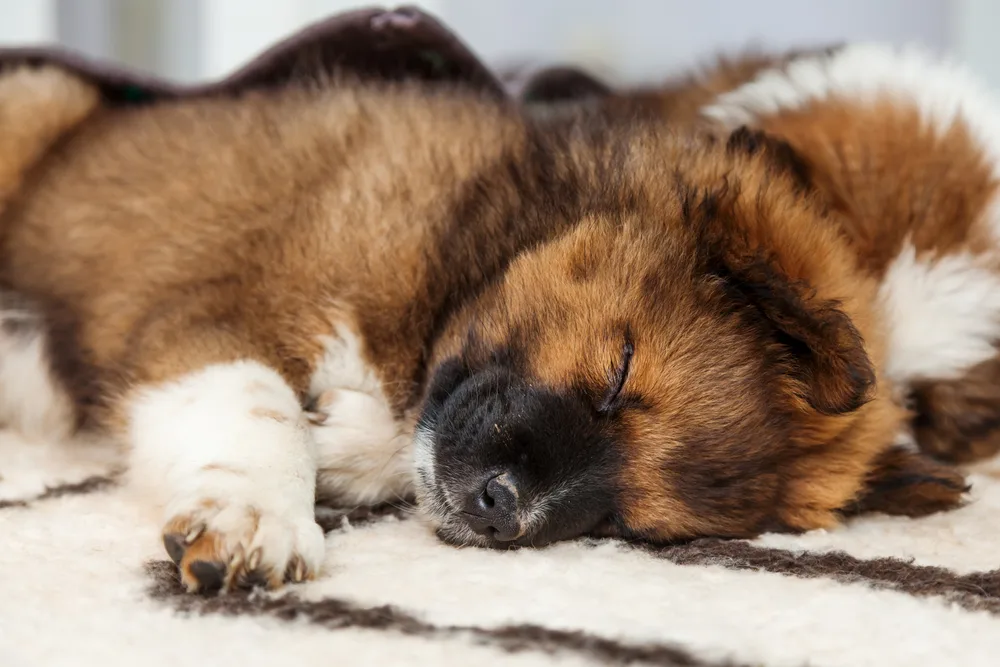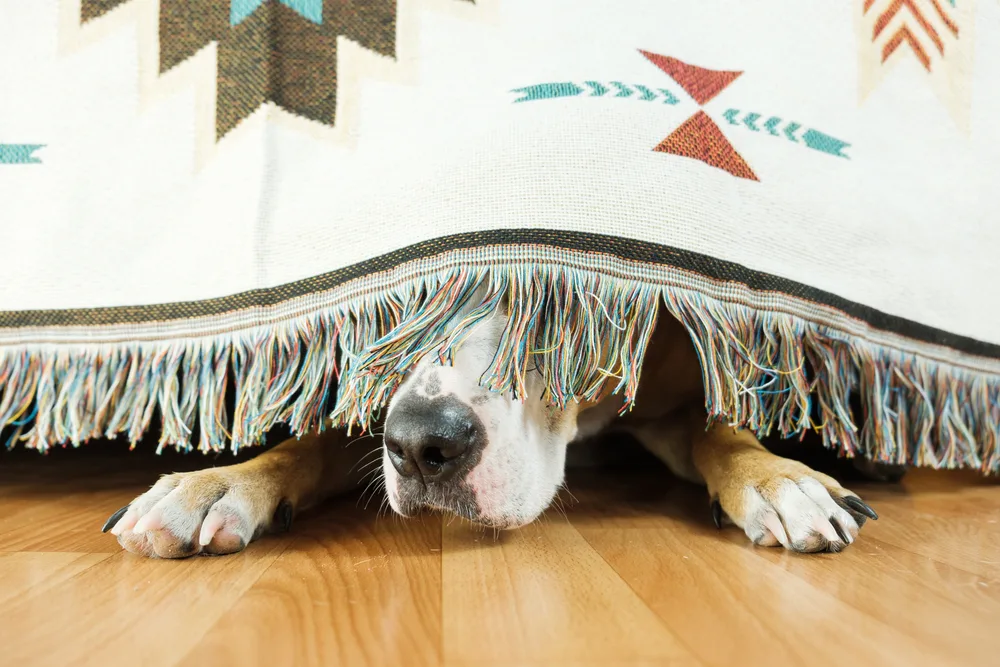Ever woken up in the middle of the night to find your dog sobbing uncontrollably?
As such, you are well aware of the potential emotional impact of the sound.
You may wonder what’s the matter with your furry baby.
You think if you were responsible for this.
Why does my dog cry in his sleep?
Dogs cry in their sleep for various reasons, the most common of which is dreaming. However, convulsions and discomfort should also be considered. Dogs may whine when they are awake yet tired because they are bored or stressed. Hard medication is also a reason for crying in its sleep.
For further information, read the whole article!
Whimpering in Sleep for Dogs: What’s Causing It?

Dogs cry in their sleep, maybe because they have a dream. But seizures or any other pain should not be ruled out.
You may hear whimpering when the dog is awake but sleepy because of boredom or anxiety. They never do so unless they have a specific reason for doing it.
But even so, insignificant the reason may be, there’s still one. For the most part, the twitching is often associated with whimpering. Twitching reasons may appear to be a minor problem. But it can also be a severe problem, as we’ll see.
Having a Dream

Nearly half of the day is spent in slumber for dogs, especially puppies and the elderly. Because a dog’s sleep cycle closely resembles that of humans.
Your pet experiences deep sleep and REM (rapid eye movement) sleep like you. Their whimpers occur during the REM phase of sleep. This is the phase of sleep; living things dream.
The phase repeats itself for small to larger dogs every 30 to 45 minutes. Smaller pups sleep for a few minutes, while more giant puppies sleep for five to ten minutes.
Brain activity peaks can cause weeping, crying, and even growling. It doesn’t necessarily mean that even if it looks like your dog is having a nightmare.
It’s impossible to tell what our beloved pets fantasize about when asleep. We can surmise that they are reliving some of the more mundane events of the day.
Solution
If your dog isn’t whimpering but instead crying out in agony, he may have a nightmare. You can attempt to rouse it but proceed with caution.
It’s better to call its name loud enough to startle it awake than to shake it awake with its body. Alternatively, if it wakes up and is terrified, it makes loud noises to keep it from biting you.
The Behaviour of a Puppy

Puppy whining and sighing while sleeping is regular. During the first two weeks after being detached from their mothers, puppies are the most vocal.
The whimpering is due to a desire for company and attention. It may nibble on you for affection. Even when asleep, puppies are more likely than adult dogs to be fidgety.
Muscle-relaxing signals can’t get through because their brain stem isn’t developed enough. The twitching and whimpering of a puppy eventually subside on its own.
Solution
I know it’s difficult, but you should avoid reacting to the whining. Try not to comfort them when they are acting this way.
Otherwise, your puppies’ whining for attention will only get louder and more annoying.
Seizure and Fits
Snoring while twitching and vocalizing can be signs of seizures and other nervous system disorders. Seizures and dreams can be distinguished based on the intensity of the twitching.
Seizing dogs’ kicking and paddling movements appear more violent. Because the legs they use are stiffer and more rigid, for this reason, dogs cry in their sleep eventually.
Solution
Dogs continuously whimper and cry in sleep while having seizures in sleep. Talk to your vet immediately if you suspect your dog’s whimpering in sleep is due to seizures.
Medical Conditions that Cause Excruciating Pain or Discomfort
When a dog is in pain, it will whimper incessantly—dogs with chronic joint pain or other painful conditions whimper in their sleep.
Because the disease affects multiple joints, older dogs with painful whimpers are more common. When a dog is suffering, it isn’t straightforward for him to get the sleep he needs.
Pain isn’t the only thing that could make you whimper in your sleep. Your dog licks in the air while too sick or having pain. But it would help if you ruled that out first.
Solution
When you suspect your dog is whimpering in his sleep because he is in pain, take him to the vet for a thorough examination.
Disturbance and Fear of Separation

Because of their attachment to their owners, many dogs whine when they are separated from them.
Separation alone isn’t the only cause of your pet’s nighttime whimpering. It can also be triggered by any arousing or frightening event (such as storms).
Solution
If you’re experiencing symptoms of separation anxiety, don’t wait to seek treatment. Instead, begin training immediately.
Boredom
Regular daily exercise is essential for all dogs to provide them with the mental and physical stimulation they require.
If you don’t take your dog out to play enough, It becomes bored with its daily routines. Despite being awake, the dog whimpers in apparent sleep as if it were bored. Your dog may dig your bed because of boredom.
You can tell a dog’s boredom by whimpering. Some dogs show these emotions by closing their eyes, making it appear as if they are asleep. But they are awake and alert.
Solution
After talking to your dog or letting him loose in the yard, the whimpering will stop, and you’ll be able to figure out the problem.
Boredom can be alleviated with more frequent workouts, as is common knowledge.
If your dog should get at least 30 minutes of exercise every day, you can treat them for having practiced with the following food products that are given below:
| Product 1 | |
| Product 2 |
Don’t forget to check the measurement instructed in the manual. Give them according to their age and size.
Tips for Better Habit
If not trained, dogs can whine and moan all night long. Some canines do not stop as they age.
Enrolling whimpering dogs in training programs early can solve the issue. Spend more time with your beloved furry friend.
Always take precautions while your dog goes through medication. Concerning any medical difficulties, see your vet.
FAQs
How do I tell whether my dog is dreaming?
Nightmares may cause your dog to growl and quiver in its sleep. They can howl, cry, whimper, or bark an alert.
As long as you and your dog are both healthy, you can sleep with your dog. Sleeping with your dog—as long as he’s not beneath the covers—may improve your sleep.
At night, do dogs become frightened?
Dogs, like humans, can have frightened feelings occasionally, and the reasons for this anxiety might vary.
